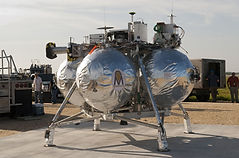Sparrow Project Proposal
What is Sparrows Purpose?
-
Project Sparrow is a developmental test bed vehicle with the intention of developing in house Vertical Takeoff Vertical Landing (VTVL) technology.
-
This is the technology required to successfully achieve retropropulsive landings which has several components:
-
Flight maneuver and landing automation.
-
Thrust must be vectored and throttled to maintain the vehicle's position or vector if moving.
-
Guidance must be able to compensate for small deviations due to environmental and systems response.
-

Armadillo Aerospace Pixel
Winner of Level 1 Lunar Lander Challenge in 2006


Masten Space Systems Xoie
Winner of Level 2 Lunar Challenge in 2009
Masten Space Systems further R&D vehicle Xaero-B
(lead to current tech & involvement in CLPS)
How Sparrow will fulfill its purpose
-
Sparrow will be A VTVL test bed vehicle to develop cradle landing technology:
-
Cradle landing is a framework that allows payload attachments to improve flight system capability.
-
-
Sparrow will be capable of precision station keeping, vertical takeoff and landing.
-
The primary objectives of the Sparrow project are to demonstrate:
-
The integrated system performance of the autonomous Guidance, Navigation and Control (GNC) system,
-
Terrain hazard avoidance sensors,
-
The coupling of the sensors with the GNC (Sensor Fusion)
-
The utilization of an integrated Main/RCS engine liquid oxygen and liquid methane propulsion system
-

Masten ground crew, interns Ellen Moyer and Wyatt Rehder, prepare Xombie for a flight of Carnegie Mellon University students' sensor package for a future lunar mission

Masten Space Systems' Xombie suborbital rocket controlled by Draper Laboratory's Guidance Embedded Navigator Integration Environment (GENIE) system.
